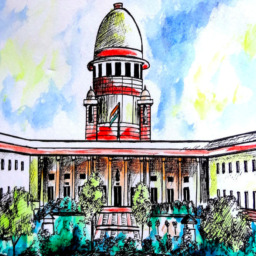NEED OF LEGAL COUNSEL TO PROTECT FROM REMAND
Legal counsel is the basic right as per the Section 12(g) of the Legal Service Authorities Act, 1987 and this facility provided by the government could be availed by any citizen of India especially for those who are either in custody, juvenile home or in any kind of custodial mental clinic, they all equally have a right to be facilitated with this service at free of cost.
An outsized variety of a prisoner who is in the middle of his trial and who don’t seem to be in a financial condition to have interactive advocates or counsel to safeguard him from the unlawful activity he has done, also they have a sense that they do not have any lawyer to protect them and due to which they remain imprisoned for a long time. Hence, the structure to function which has been formulated by the Legal Services Authority of National was generally enforced by Haryana State Legal Services Authority in every district as well as in sub-divisions of Haryana, in order, that nobody’s right will be taken away during the remand hours merely because they do not have any lawyer on behalf of them or no one remains with no lawyer who can represent them. The Lawyers empanelled as per the ‘Legal Aid Counsel’ scheme which states that lawyers during the remand hours generally have to be present in the courtroom to file the prisoner’s application, provide them with legal guidance so that the prisoner is aware who is representing them for their trail.
Therefore, in the letter of 15.09.2009, the DGP of Haryana provided guidelines to the Commissioners in the Gurgaon and Faridabad city, guidelines have been provided to the DSP, Haryana and the SI of Police, and to Ambala Cantt, Haryana to address the SHOs in Haryana to act as per requiring help and be more cooperative with the woman advocates who for assigned duties are chosen by the CJM-cum-Secretaries and District Legal Services Authorities in the State of Haryana.
STATE TO FUND FOR LEGAL AID
In a country like India where every second accused is incapable of arranging an advocate for himself because they are deprived of poverty and impoverishment situation, then for those situations, state government at their own cost has arranged for the free legal services. The qualification to free legal guide isn’t subject to the denounced for making an application under the steady gaze of the Magistrate/Sessions Judge, who will undoubtedly illuminate the blame regarding his entitlement to get free lawful aid and to give a lawful guide, aside from when the charged isn’t willing to exploit the free legal aid services given by the State. It is well said in a judgment that police officer, instantaneously has to notify the Legal aid committee which is nearer to that police station, whenever an arrest of a person has been made and he has been put behinds the bars in the station itself so that the Legal Aid Committee in such circumstance can act accordingly and ask the arrested person that whether he has his lawyers who are at his own expense or does he requires the lawyer to be provided to him at the state expense.
The basic right of every accused is the right to have legal assistance when they are in custody or when police are about to interrogate them, then in various cases, SC has given judgment that such person should be provided with legal guidance. In the Nandini Sathpaty v P.L Dani[1] case the need for providing legal guidance arose which is that at every stage of the arrest legal assistance through the medium of a lawyer is a must. The meaning behind the Art. 22 (1) is that it is the basic right of law that the law guidance must be accessible for the sake of discussion to any imprisoned person who is in conditions of near-custodial cross-examination. Moreover, the compliance of the right against self-incrimination could be at its best when accuses himself is given this opportunity and which is also his right, that he could consult his matter with the lawyer of his own choice.
CCTV SURVEILLANCE AT THE POLICE STATION
D.K. Basu v. State of West Bengal,[2] in this case, a need for the CCTV camera footages was raised where it says that a CCTV should be installed at the crime scene and a committee should be developed which would analyse those recordings and make a conclusion based on them. The court directed COB that the video made at the crime scene should at least once be presented at the necessary and desired place as per the matter.
In 2020, a notice by the court was sent to the Ministry of Home Affairs regarding the presence of CCTV cameras at the police station. Court correspondingly asked all the required states about the status of CCTV cameras in their respective police stations but only 14 states responded upon the same which include Tamil Nadu, Mizoram, Chhattisgarh, West Bengal, Tripura, Karnataka, Assam, Punjab, Manipur, Nagaland, Uttar Pradesh, Sikkim, Madhya Pradesh, Meghalaya, and two Union Territories, Puducherry, and Andaman & Nicobar Islands. Intention as per the court to send the notice was to know that how many CCTV cameras are being installed and in how many police stations plus court also wanted an update on their working status and also to guarantee that the CCTV cameras not only at the main exit and entrance but also should cover the lock-up rooms, the reception and should be in all the corridors of the Police station. It should also be in the officer’s room to keep an eye on all proceedings which they due during any case filed. Not only should this it also be installed in such a manner that it only covers the outside part of the washroom and fully cover the area behind the Police Station. Therefore, an order has been given by the SC to the states asking them to assign funds for the CCTVs camera.
NCRB conducted a report in which it was estimated that there was more than 1700 custodial death from 2001 to 2018 and there were more than 452 custodial deaths in the period of 2014 to 2018 and for these, no police officer was convicted. For the year 2017, NCRB in the report observed that at least 255 people died in the police custody which could be because of torture or other way and on the death of these 255 people only 3 police officers were convicted. The same situation has aroused in the 2019 year as well where around 85 people died in the police station and only 23 policemen were convicted which highlights how worse the situation is there. As of now after the order of SC, no excuse has been left with the police officers to not install the CCTV camera in the police station. Delhi government has thought to install nearly 1.4 lakh cameras in around 15,000 police stations. A good decision of to set up Human rights courts in each district to hear complaints of torture in custody.
HOW THESE ARRANGEMENTS OF THE APPOINTING LAWYERS AT THE POLICE STATIONS SHOULD BE DONE
In the Police station, a monthly roaster of the list of the lawyers has to be made by ensuring that it covers all the police stations. Lawyers can be put crossly on the duty in the sense that random appointments of the lawyers could be done as per their suitable time. While appointing or assigning the duty to the lawyer it must be kept in mind that lawyers assigned should be adequate in terms of their requirements in respective police stations and no accused person should be left with no advocate at the end of the day.
RECOMMENDATIONS
Some of the recommendations to make this entire system of appointing lawyers so that legal services could be utilized at their best.
- As we can see that even after raising the standard of providing legal assistance it is still very difficult for the suspect or the arrested person to be able to meet up with the lawyer at the police station. This could be because of the negligence of the police officer who does not facilitate with the information to the accused about their rights that they can take consult from the lawyer of their choice. So, certain steps to make aware the accused of their legal rights should be taken.
- The legal aid provided in the police station with DLSA who are appointed and with knowledgeable lawyers who are positioned for 24×7 services as per the chart to provide basic legal advice and representation should be appointed and their appointment should be duly checked properly by a designated person.
- Such volunteers should also be appointed which will keep a check about whether the lawyer has reached the station or not and would also tell them where the lawyers are needed so that the lawyer whose duty is there could reach the place where he is needed.
- There has to be some method so that the relationship of police and lawyers becomes fruitful so that together they can mitigate any risk arising out of any circumstances. The total number of community paralegal volunteers and lawyers assigned to each police station must be determined by the caseloads for that particular police station.
Author(s) Name: Kajal Tanwar (OP Jindal Global University, Sonipat)
References:
[1] AIR 1978 SC 1025.
[2] AIR 1997 SC 610.















